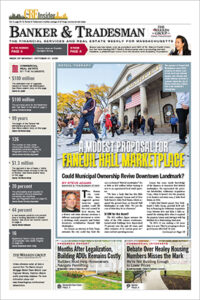Grace Lee
President and CEO, St. Mary’s Credit Union
Industry experience: 25 years
Grace Lee has taken over as president and CEO of St. Mary’s Credit Union. After leaving the regional giant M&T Bank, Lee says she will have increased ability to be involved in the community the financial institution serves. Lee joined St. Mary’s Credit Union after several years as the Eastern Massachusetts regional president and group lead of New England Government Banking at M&T Bank. Lee was honored by The Boston Arts Academy Foundation for her philanthropic work while at M&T Bank, receiving its civic responsibility award last week.
Q: How important is it for financial institutions to be active participants in their communities, whether it’s philanthropy or something else?
A: It’s essential. For me, moving from a super-regional [bank] to a credit union – and I remind everybody, a credit union is a nonprofit, so it has a different mission – it’s almost like passing a baton. If there’s someone that [St. Mary’s Credit Union] cannot bank, or they’re not ready to bank with us, there’s micro lenders for businesses. We hand them over; we don’t just decline. We hand them over and we help them with their journey. We stay with their journey, and when they’re ready for us, we take care of them. When they outgrow us, and their business is successful and they need a larger platform, they move on to M&T Bank, and then from there, if you are a global institution that needs a really sophisticated platform, you’re going to move on to JPMorgan. So, the companies that bank with JPMorgan may not necessarily be appropriate for me but there’s a role for everyone, and I say that because it is critical to the health of any community.
In order for a community to be vibrant, you need not just the civic engagement and the philanthropy, but you also need the economic landscape to create opportunities so people can thrive and grow – not just sustain, but thrive and grow. I remind everybody my background is in civil rights, social justice. When you know Martin Luther King Jr. marched, it was for civil rights and jobs. It was about economic mobility. It was about having opportunities that put us on a level playing field and giving us the opportunity to move forward.
If I started to ask you, “What’s in your bank account? What’s in your retirement account? What’s your credit rating?’ It’s triggering. I tell my bankers, I tell all my colleagues, “Remember when you talk about money, it is the most personal thing you’re going to talk to anybody about.” It represents what you can provide to your family or what you can’t, what you can get access to, or what you can’t: Everything that’s so core to a human being’s existence. You can’t talk about money without being triggered. I don’t care how sophisticated you are, it is the most personal thing you’re going to talk to anybody about outside of their family.
Q: Especially coming from more of a regional role, what’s it like to be able to work at a much more local scale in your new role?
A: It’s incredibly exciting. I’m [also] going from being a regional president to the CEO. So that means all the things that I believe passionately about, I have direct control over. It is my opportunity to really show up in a community in a way that I believe financial institutions should. Credit unions are extraordinary because they provide everything else, but you don’t have to manage to the quarterly earnings. We are beholden to our members in the community, hard stop. We are tax-exempt so we belong to the communities and the members that we serve. Our horizon isn’t quarterly, but it has a longer trajectory so we can do things in a manner that doesn’t just look at short-term gains, but rather the long-term sustainability of it, not just for our institution, but for our members and our communities.
Q: It’s kind of a dual role in the sense that you want to financially be able to contribute to the community, but also want to be an active member. How important is it to play both of those roles?
A: It’s essential. You can’t have one with the other. I feel like if you are professing you are in service to the community, I don’t care if you’re a bakery, a restaurant, a pharmacy or financial institution, that requires an entire integration of the institution into the community. It doesn’t stop with your car loan, it goes beyond that to making sure that we are not just good corporate citizens. I have to remind people, these are our neighbors, these are our teachers, these are our soccer coaches. We have a moral and civic responsibility to make sure that those that we interact with are doing okay.
So, being recognized for civic engagement, to me, just means that you are not only aware of our responsibility to each other, but you are also acting on it. I think fundamentally, people are good. I think that if you saw somebody struggling, and they dropped all of their groceries in front of you, sans an emergency at home you lean down and you start picking it up. That’s civic engagement. I think when people need help, people want to help, if they have the resources. As a financial institution, we can help in a very unique way so we should. So, to me, it is all in the same kind of mission and effort.
Lee’s Five Favorite Things
- Favorite Movie: “The Pursuit of Happyness”
- Favorite Building in Massachusetts: Winthrop Center
- Favorite Grocery store: H-Mart
- Favorite Book: “Native Speaker,” by Chang-Rae Lee
- Favorite Sports Team: The Boston Celtics







